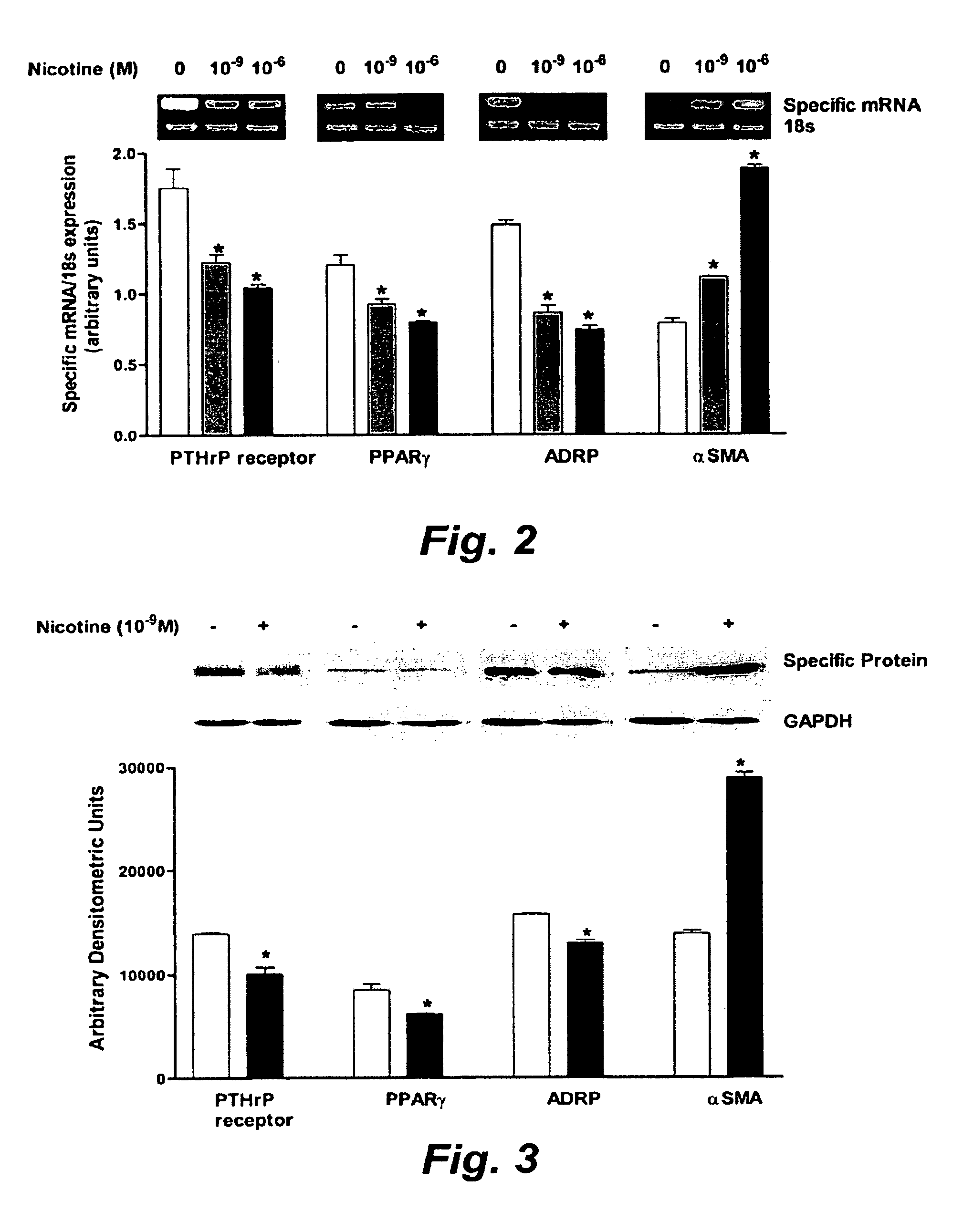Treatment for nicotine-induced lung disease using peroxisome proliferator-activated receptor gamma agonists
a technology of peroxisome proliferator and receptor, applied in the field of lung diseases, can solve problems such as abnormal lung development and function, and achieve the effect of inhibiting or repairing the deleterious effects of smoking on the lung
- Summary
- Abstract
- Description
- Claims
- Application Information
AI Technical Summary
Benefits of technology
Problems solved by technology
Method used
Image
Examples
example 1
Mechanism of Nicotine-induced Pulmonary Fibroblast Transdifferentiation
[0189]In this example, we tested the hypothesis that in vitro nicotine exposure disrupts specific epithelial-mesenchymal paracrine signaling pathways and results in pulmonary interstitial lipofibroblast (LIF)-to-myofibroblast (MYF) transdifferentiation, resulting in altered pulmonary development and function. Studies were done to determine whether nicotine induces LIF-to-MYF transdifferentiation and to elucidate underlying molecular mechanism(s) involved and to determine whether nicotine-induced LIF-to-MYF transdifferentiation could be prevented by stimulating specific alveolar interstitial fibroblast lipogenic pathway. WI38 cells, a human embryonic pulmonary fibroblast cell line, were treated with nicotine with or without specific agonists of alveolar fibroblast lipogenic pathway, PTHrP, DBcAMP, or the potent PPAR stimulant rosiglitazone (RGZ) for 7 days. Expression of key lipogenic and myogenic markers was exam...
example 2
In Utero Nicotine Exposure Alters Fetal Rat Lung Alveolar Type II cell Proliferation, Differentiation, and Metabolism
[0232]We suggested that alveolar interstitial fibroblast-to-myofibroblast transdifferentiation may be a key mechanism underlying in utero nicotine-induced lung injury. However, the effects of in utero nicotine exposure on fetal alveolar type II (ATII) cells have not been fully determined. Placebo, nicotine (1 mg / kg), or nicotine (1 mg / kg)+the peroxisome proliferator-activated receptor (PPAR)-γ agonist prostaglandin J2 (PGJ2, 0.3 mg / kg) was administered intraperitoneally once daily to time-mated pregnant Sprague-Dawley rats from embryonic day 6 until their death on embryonic day 20. Fetal ATII cells were isolated, and ATII cell proliferation, differentiation (surfactant synthesis), and metabolism (metabolic profiling with the stable isotope [1,2-13C2]-D-glucose) were determined after nicotine exposure in utero or in vitro. In utero nicotine exposure significantly stimu...
example 3
Nicotine-Induced Lung Injury can be Reversed
[0298]The data presented below indicate that using the approach outlined above, the nicotine-induced lung injury can not only be prevented but also reversed. It is believed this is first demonstration of the possibility of a reversal of the nicotine-induced lung injury by using any approach. As illustrated below, in cultured human lung fibroblasts, we first documented the nicotine-induced changes in fibroblast phenotype to a muscle like phenotype and then by molecularly manipulating these nicotine treated fibroblasts, we were able the reverse the nicotine-induced fibroblast phenotype to its original non-nicotine exposed phenotype.
[0299]Embryonic human lung fibroblasts initially exposed to nicotine (10−9M) for 7 days and then treated with PPARγ agonists (RGZ, PTHrP, or cAMP) for the following 7 days. Even after nicotine treatment was stopped, PTHrP receptor expression continued to be significantly lower in nicotine treated controls compared...
PUM
| Property | Measurement | Unit |
|---|---|---|
| ionic strength | aaaaa | aaaaa |
| ionic strength | aaaaa | aaaaa |
| temperature | aaaaa | aaaaa |
Abstract
Description
Claims
Application Information
 Login to View More
Login to View More - R&D
- Intellectual Property
- Life Sciences
- Materials
- Tech Scout
- Unparalleled Data Quality
- Higher Quality Content
- 60% Fewer Hallucinations
Browse by: Latest US Patents, China's latest patents, Technical Efficacy Thesaurus, Application Domain, Technology Topic, Popular Technical Reports.
© 2025 PatSnap. All rights reserved.Legal|Privacy policy|Modern Slavery Act Transparency Statement|Sitemap|About US| Contact US: help@patsnap.com



